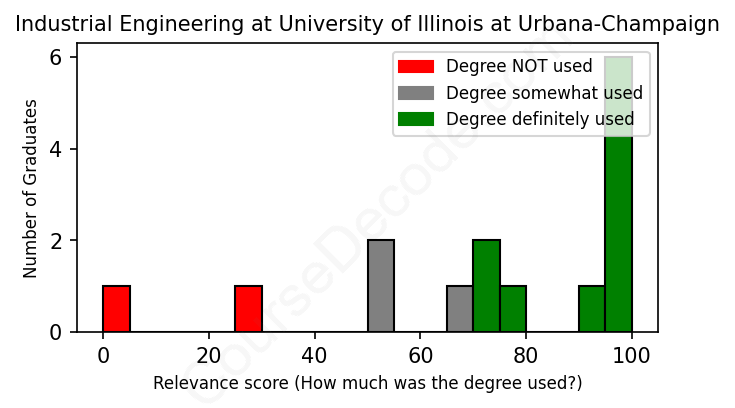
First, some facts. Of the Industrial Engineering graduates from University of Illinois at Urbana-Champaign we've analyzed , here's how many have used (or NOT used) their degree in their career:

These are estimates based on AI analysis of 15 LinkedIn profiles (see below).
The verdict? Above average. Overall, with an average relevance score of 73%, Industrial Engineering graduates from University of Illinois at Urbana-Champaign have a higher likelihood (+6%) of finding work in this field compared to the average graduate across all fields:
And for comparison, here's the chart for all profiles we've looked at across all degrees.
Also, after graduating, only 26% of these graduates have pursued further education other than another Bachelor's degree (such as a Masters degree or other), compared to the average across all profiles of 35%. This suggests a Bachelors degree is enough for most Industrial Engineering graduates, and it's normal to look for work straight after graduation.
See the details:
|
Relevance score: 100% We think this person has gone into a career highly relevant to their degree. We think this person has gone into a career highly relevant to their degree.
DEGREE INFOGraduated in 2016 from University of Illinois at Urbana-Champaign with a Bachelor of Science (B.S.) in Industrial Engineering. Also pursued further education since (see below). JOB HISTORY SINCE GRADUATIONRisk Control Consultant Liberty Mutual Insurance Jun 2016 - Sep 2017 Risk Control Consultant II  Liberty Mutual Insurance Oct 2017 - Aug 2019 Senior Risk Control Consultant  Liberty Mutual Insurance Sep 2019 - Mar 2022 Technical Risk Control Consultant  Liberty Mutual Insurance Mar 2022 - Dec 2023 Technical Risk Control Consultant II  Liberty Mutual Insurance Dec 2023 - Present FURTHER DEGREES DONE SINCE GRADUATINGMaster of Business Administration - MBAUniversity of Illinois at Urbana-Champaign 2020 - 2022 ABOUTI am an experienced risk control consultant focused on improving processes to reduce organizations' overall cost of risk. I work with Liberty Mutual's large commercial customers to identify, assess, and help manage risk within their operations. I work with a variety of companies, however, the majority of my customers are in the manufacturing industry. My role also involves me helping develop other consultants in the ergonomic and manufacturing disciplines.I received both my Master's Degree in Business Administration and Bachelor of Science degree in Industrial Engineering from the University of Illinois at Urbana-Champaign. I utilize my degrees to assess and evaluate business operations for opportunities for improvement. My current role has allowed me to develop skills in cultivating strong business relationships, leading projects, and driving continuous improvement for a variety of clients. |
The top 10 most common jobs done by the graduates we've analyzed (ranked most common to least) are:
The most common types of jobs held by graduates from the University of Illinois at Urbana-Champaign with a degree in Industrial Engineering tend to be closely linked to roles like Continuous Improvement Leaders, Engineers in supply chain and quality assurance, and various consulting positions. It's clear that many individuals use their education to work in areas that emphasize process optimization, quality control, and project management. For instance, positions like Continuous Improvement Leader and RPM Engineer directly leverage industrial engineering principles to enhance operational efficiencies. The prevalence of roles like Quality Engineer and Operations Excellence Engineer also highlights a strong connection between their job functions and the skills acquired in their studies.
However, it's also worth noting that not every job held by these graduates falls neatly into the realm of industrial engineering. Some roles, particularly in consulting or technical fields like software development, may only use the analytical or problem-solving skills developed during their education in a more indirect way. For instance, while positions like Business Analyst at INSIGHT2PROFIT are relevant since they focus on data analysis and process improvement, others, like the Associate at PwC, do not apply industrial engineering knowledge extensively. Overall, many graduates find rewarding roles that align with their studies, but some veer off into areas that don’t fully capitalize on their specialized training in industrial engineering.
Here is a visual representation of the most common words in job titles for Industrial Engineering graduates (this is across all Industrial Engineering graduates we've analyzed, not just those who went to University of Illinois at Urbana-Champaign):

Graduates from the Industrial Engineering program at the University of Illinois at Urbana-Champaign seem to have strong career trajectories, particularly in fields that align well with what they studied. Many of these graduates land their first jobs in roles that directly relate to their industrial engineering skills, such as continuous improvement positions, quality engineering, or various engineering consulting roles. For instance, those who graduated in the early 2010s often started at companies like DHL Supply Chain and Eaton, quickly moving up to more senior roles within a few years. This early work experience appears to serve them well, as they transition into roles that require greater responsibility and expertise.
Fast forward five to ten years, and you can see that many graduates have moved into leadership positions or specialized roles within their industries. They often progress into managerial roles, like program managers or senior consultants, and some even make their way to the director level, especially in firms like PwC or Deloitte. There’s even a mix of those who venture into tech and data analytics, such as working at Amazon Web Services or Salesforce, which highlights the versatility of an industrial engineering degree. Overall, it seems like these graduates are finding successful careers that are not only relevant to their education but also offer room for growth and further specialization.
Getting a Bachelor’s degree in Industrial Engineering at the University of Illinois at Urbana-Champaign can be pretty challenging, but it's definitely doable if you're motivated and willing to put in the effort. The program covers a mix of engineering principles, mathematics, and systems design, which means you'll have to tackle some rigorous coursework, especially in areas like statistics and optimization. Many students find it tough but rewarding, as it involves solving real-world problems and working on projects that require critical thinking and creativity. Overall, it’s about average in difficulty compared to other engineering degrees, so if you love problem-solving and can manage your time well, you'll likely do just fine!
Most commonly, in the LinkedIn profiles we've looked at, it takes people 4 years to finish a Bachelor degree in Industrial Engineering.
So, looking at the job history of these Industrial Engineering grads from the University of Illinois at Urbana-Champaign, it seems like they're doing pretty well financially. Most of them have steadily climbed the career ladder, moving from positions like interns and entry-level roles to more senior titles like “Senior Engineer” or “Manager,” which usually come with decent salaries. For example, those who ended up at big companies like Amazon Web Services and Salesforce are likely earning quite a bit, especially as they take on leadership roles. The pay for positions in fields like engineering and consulting tends to be pretty solid, particularly because these jobs often offer strong career growth potential. Overall, it kind of looks like these folks are on a path to making some good money!
Here is a visual representation of the most common words seen in the "about" section of LinkedIn profiles who have a Bachelor degree in Industrial Engineering (this is across all Industrial Engineering graduates we've analyzed, not just those who went to University of Illinois at Urbana-Champaign). This may or may not be useful:

Here are all colleges offering a Bachelor degree in Industrial Engineering (ordered by the average relevance score of their Industrial Engineering graduates, best to worst) where we have analyzed at least 10 of their graduates:
| College | Score | Count |
|---|---|---|
 Iowa State University Iowa State University
|
88 | 11 |
 North Carolina State University North Carolina State University
|
87 | 12 |
 California Polytechnic State University-San Luis Obispo California Polytechnic State University-San Luis Obispo
|
87 | 15 |
 Texas A&M University Texas A&M University
|
83 | 39 |
 Purdue University Purdue University
|
81 | 36 |
 University of Central Florida University of Central Florida
|
80 | 23 |
 Georgia Institute of Technology Georgia Institute of Technology
|
80 | 59 |
 Penn State University Penn State University
|
79 | 16 |
 Texas Tech University Texas Tech University
|
79 | 10 |
 University of Pittsburgh University of Pittsburgh
|
79 | 15 |
 University of Washington University of Washington
|
78 | 12 |
 University of Arkansas University of Arkansas
|
78 | 11 |
 University of Wisconsin-Madison University of Wisconsin-Madison
|
76 | 13 |
 University of Illinois at Urbana-Champaign University of Illinois at Urbana-Champaign
|
73 | 15 |
 West Virginia University West Virginia University
|
71 | 19 |
 Clemson University Clemson University
|
69 | 23 |
 University of Florida University of Florida
|
64 | 11 |